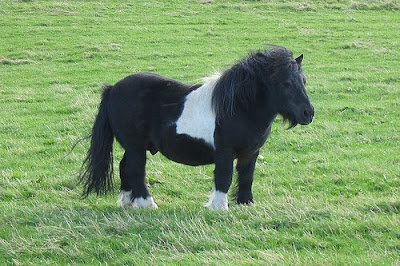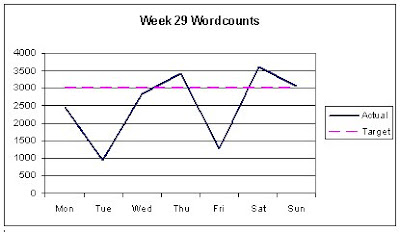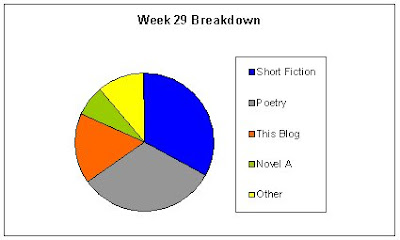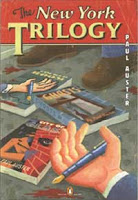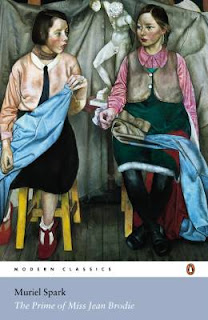

The planets aligned such that I finished two books on Friday.
My lunch time reading for the week was
The Prime of Miss Jean Brodie by Muriel Spark - - its 128 pages fit perfectly into five thirty-minute sessions (I read a bit slower while eating, not possessing the multi-tasking gene and all).
And my walking to and fro audiobook was
The Wasp Factory by Iain Banks.
It was not a coincidence, exactly, that both books were by Scottish authors - - each was a token Scottish borrowing from separate trips to the Edinburgh Central Library - - though I didn’t realise I had Scot against Scot until well into the week.
When I finished both books on the same day it sealed their fates: comparisons must be drawn (and even when the analysis evaporates, they will remain yoked in my memory).
The few references to Inverness in The Wasp Factory (it is the nearest city to the island Frank Cauldhame and his father inhabit) were enough for a spark of recognition, a flash of appropriate terrain (though I’m pretty sure the island is fictional) from one of my road trips north.
If the setting of The Wasp Factory provided a spark, The Prime of Miss Jean Brodie set off fireworks. The story is set in Edinburgh, primarily 1930-36, though it stretches beyond in terms of time and place (more on this later). I live in Edinburgh in 2008. Here, seventy years is nothing.
The passage in chapter two which begins, “It is time now to speak of the long walk through the old parts of Edinburgh…” takes everyone who’s important (Miss Brodie, her set of six girls, and the reader) across the Meadows, to the Grassmarket and onto the High Street. Though you are more likely to encounter American tourists (why are they all compelled to buy woollen sweaters and wear them the next day?) than a crowd of unemployed (“The Idle” as Eunice calls them), even the modern tourists can pick up the grimy vibe that the Old Town will never shake.
Then there’s Mr Lowther’s grand old house in Cramond, the clouds on the Pentland Hills, the warning that one of the girls might end up a Girl Guide leader in Corstorphine… Even the school-girl rhyme Edinburgh, Leith / Portobello, Musselburgh / And Dalkeith was its own Catherine Wheel of recognition. I’m not making a point about the worth of the book (yet), just that reading is so often enriched by what you can bring to the text.
Similarly, the reference to Miss Brodie’s ancestor Willie Brodie would have gone over my head before I arrived in Edinburgh. Sure, there’s enough in the text to understand how this points to another case of duality, but for anyone who has had a pint in Deacon Brodie’s the message is writ in neon.
These recognition fireworks go some way to explaining why I enjoyed The Prime of Miss Jean Brodie so much, though they are no basis upon which to make claims about the quality of the book.
But it is a quality book. Its structure, zipping forward and back in time, is discomforting but, at the same time, exhilarating. In proleptic fits were are told Miss Brodie will be betrayed, whom she will be betrayed by, and ultimately the minutiae of the betrayal, all before their proper time. That is, ‘proper’ if this was to be a more traditional narrative where suspense is built by keeping cards face down until all the money is on the table.
This is how The Wasp Factory works. We are presented with mysteries and questions ranging from the prosaic (What is the wasp factory? What’s in the study) to the significant (Why did Eric go crazy? Why does Frank act the way he does?) and we are given answers when the story is good and ready. One of the signs that The Wasp Factory is a good book is that the seemingly prosaic questions, the things that keep your reading from page-to-page (rather than make you pick up the book once you have put it down), are intrinsically linked to the significant questions. But once we know why Eric is crazy (the Incident of the Smiling Child is perhaps the most memorable part of the novel, though it is also the most conspicuous answer to a question posed by the structure) we do not return to the question.
Okay, fair enough.
But is this how we function in real life? Once we know that the gulf stream is primarily responsible for Scotland being more temperate than should be expected of its longitude, we still may ponder the phenomena. By saving up the best revelations for the end, a book can’t really do this pondering thing. This: Walking Round The Building To See If There’s Another Entrance/Exit.
[Aside / Great Moment in iPod Shuffle: ‘Cage Around the Sun’ by Monster Magnet just played on iTunes. It strikes me as the perfect soundtrack to The Wasp Factory, both book and song being rooted in adolescence; many confluences between the lyrics and the story (the construction of elaborate devices, cruelty to animals, “Queen Bee F***ing Cyclops” vs Wasp Torturing Eunuch…).]
The final twist of the The Wasp Factory was okay (*damning with faint praise alert*), but it is followed by the most tedious part of the novel: Frank muses about what we’ve just learnt in the dénouement and how it made him what he is. The problem is that the action of the novel has ended, there are no other doors we are waiting to see behind, so that all we have is words. The big themes that are drawn up by the narrator sound like “big themes”, which means they sound ham-fisted.
But in The Prime of Miss Jean Brodie, we know Miss Brodie will be betrayed by one of her set for most of the book, and (I won’t spoil it for you) which girl it is for at least half of the journey. The question of Who shifts to Why, and this is always a much trickier question.
As we dance around the thirties, weaving in and out of the Brodie Set’s adolescence, we are not solely reading for answers, we are reading for the pleasure of the book’s company. It is a tremendously funny book. I didn’t realise this until a third of the way through, then, with every page, its funniness increased. I think if I were to re-read it now, I’d find the beginning hilarious…
[Five minutes later…]
Okay, I just re-read the first few pages and I was right. “All of the Brodie set, save one, counted on its fingers, as had Miss Brodie, with accurate results more or less.” On a first read through, one assumes the humour resides solely in the counting on fingers, which might be enough for a mental grin But, on a second read through, the “more or less” is so telling it becomes the punch line (inaccuracy will consign Brodie and others to fates unbecoming the crème de la crème). And then there’s the “save one”, who we learn further down the page must be Monica Douglas, who is “famous mostly for mathematics.” But on a second reading, one knows this already, and it is therefore adds another delight to the already brimming sentence.
This is not the first novel by Muriel Spark I have read (it’s the third), though it is the first that struck me as masterly. It can’t all be down to the favourable comparisons with The Wasp Factory and the fact it’s set in the city I’ve lived in for the last ten months. It is certainly her most famous, there must be good, universal reasons for that. And I remember someone urging me to read it a couple of years ago. Though then, of course, I wouldn’t have known where Cramond was.
***
Footnote: Last week Iain Banks wrote an interesting piece for the Guardian on the writing of The Wasp Factory (it was his first book to be published, though the sixth he wrote). I'm linking to it here because a) it's interesting b) shares some similarities with my own position as manque novelist and c) I feel a bit bad for using The Wasp Factory as the contrast to a book I clearly preferred.
